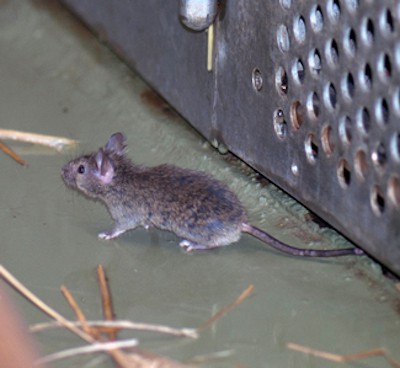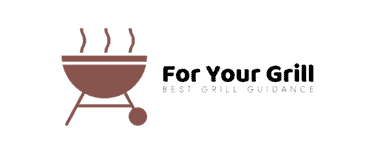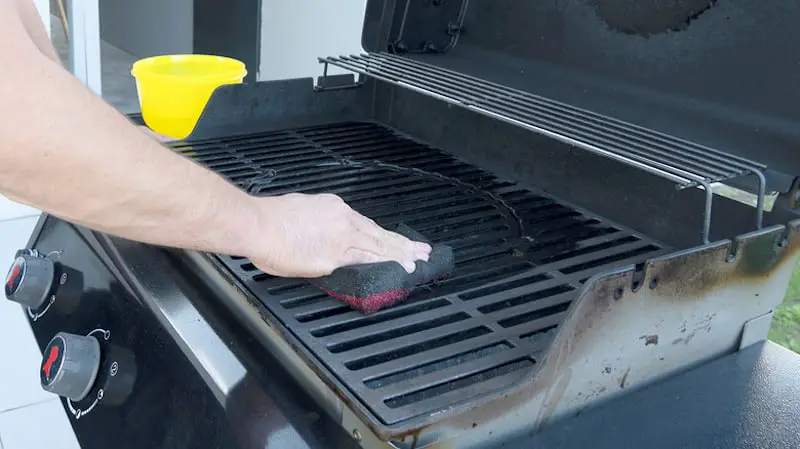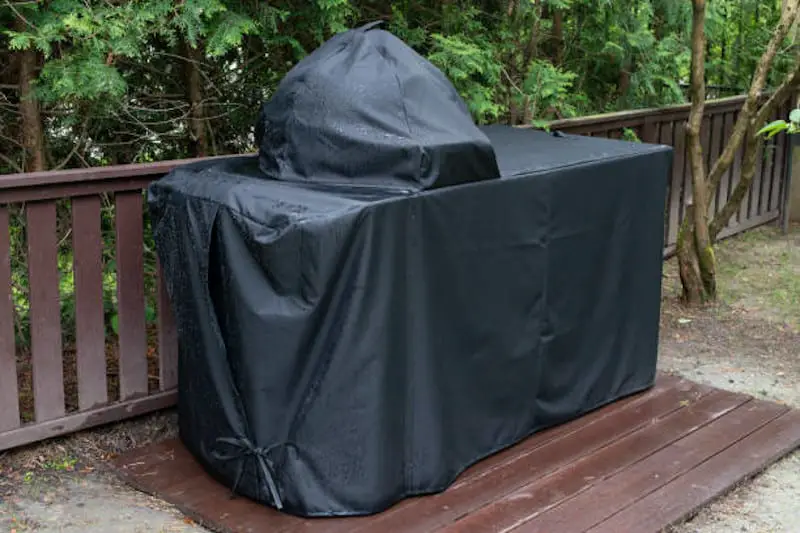Grilling season is upon us, and there’s nothing better than firing up the BBQ for friends and family. But what if you discover that mice have made a home in your grill? Not only can this put a damper on your cookout plans, but it also poses health risks.
Fret not! This blog post will guide you through the process of cleaning and disinfecting your grill after a mouse infestation while providing helpful tips to keep them at bay in the future.
Key Takeaways
- Discovering mice in your grill can pose serious health risks as they are known carriers of various diseases like hantavirus and salmonella that can be transmitted through their feces and urine.
- Thoroughly cleaning a grill after a mouse infestation is essential to ensure its functionality and safety. This entails disassembling the parts, scrubbing them with a homemade mixture of soapy water and white vinegar, checking for signs of damage, and repairing them accordingly.
- To keep mice away from the grill in the future, proper food storage and disposal habits, regular cleaning, and maintenance tasks such as removing leftover food particles after each use or using natural repellents like peppermint oil should be employed. Additionally, keeping the area around the grill clean by sweeping or vacuuming regularly also helps deter rodent infestations.
- Using mouse repellents may help prevent infestations but combining it with other preventive measures such as proper food storage practices or regular cleaning is critical for ensuring safe grilling sessions free from unwanted pests!
Understanding The Risks Of Mice On Your Grill
Discovering mice in your grill is not only unnerving, but it also poses several health risks that every grill owner should be aware of. As rodents, mice are known carriers of various diseases such as hantavirus and salmonella, which can be transmitted through their feces and urine.
These unwanted rodents in your grill can contaminate surfaces with dangerous pathogens. Leftover food particles attract mice, leading to nesting in your BBQ setup.
Understand the risks and follow proper cleaning procedures for a safe, contaminant-free grilling experience.
Step-by-Step Guide To Cleaning A Grill After Mice
To thoroughly clean your grill after a mouse infestation, it is important to follow a step-by-step guide that includes disassembling and scrubbing all components, sanitizing the parts with soapy water and white vinegar, and checking for any damage or signs of rodents.
Mixture Of Soapy Water And White Vinegar
A powerful yet simple solution to sanitize your grill after mice have paid a visit is the mixture of soapy water and white vinegar. This homemade cleaning agent not only removes grease, grime, and food particles but also effectively disinfects surfaces from potentially harmful bacteria left by mouse droppings and urine.
Armed with the mixture, scrub every component of the grill thoroughly using a brush or sponge soaked in it. The acidity in the vinegar helps break down stubborn residues while its antimicrobial properties ensure that all traces of mouse feces are eliminated, reducing any potential health risks associated with rodent infestations such as hantavirus or salmonella.
Disassemble And Clean All Components
The first step in ensuring thorough cleaning of your grill after a mice infestation is disassembling and individually cleaning each component. Begin by turning off the gas, disconnecting the propane tank, or unplugging an electric unit for safety purposes.
Carefully remove grates, burners, heat tents (or flame tamers), and grease trays from the grill.
With all components removed, create a mixture of soapy water and white vinegar – which acts as a natural disinfectant – to diligently wash each item.
Use tools like steel wool or an appropriate brush to scrub away stubborn dirt and debris that might harbor any remaining rodent residue. For heavily soiled parts such as grates, you can soak them in the solution before scrubbing for better results.
Additionally, applying baking soda on problematic areas prior to rinsing can further enhance their cleanliness level.
Scrub And Sanitize The Grill And Its Parts
Next, it’s time to scrub and sanitize the grill and all of its parts thoroughly. To do this, you should remove the grates, burner hoods, grease pan, and any other removable components from your grill.
You should also use a scraper to remove any stubborn bits of food or debris that might be stuck on the inside walls of your grill. Once everything has been scrubbed clean, it’s important to rinse everything off completely with water and let it dry in the sun for a few hours before reassembling your grill.
This will ensure that your grill is completely sanitized and ready for safe use once again.
Check For Signs Of Damage And Repair As Needed
While cleaning your grill after mice, it’s important to keep an eye out for any signs of damage. Mice can often chew through wires and other materials, causing potential safety hazards.
Look for any frayed or damaged wiring around the grill and replace it if necessary. Check the burners and propane connections for any cracks or leaks that could lead to gas buildup or fire hazards.
In addition to repairs, take note of any wear and tear on the grill grates or other components that may impact its performance. Over time, heat exposure can cause metal surfaces to warp or rust which may affect how evenly your food cooks.
How To Keep Mice Out Of Grill

To keep mice out of the grill, it is important to properly store and dispose of food, regularly clean the grill, use mouse repellents, and keep the area around the grill clean.
Proper Food Storage And Disposal
To keep mice out of your grill, it’s crucial to properly store and dispose of food. One common mistake is leaving leftover food particles from previous grilling sessions that can attract rodents.
Additionally, storing pet food or birdseed near the barbecue area can be an invitation for mice to nest nearby. Therefore, it’s best to store these items in airtight containers away from your yard or inside a secure garage or shed.
Regular Cleaning And Maintenance
Regular cleaning and maintenance are essential to keep mice away from your grill. Leftover food particles, grease, and debris can easily attract mice and other rodents looking for shelter or a source of food.
It is recommended to clean the grill after every use using a wire brush or scraper to remove any leftover food particles from the grates, burners, and other parts of the grill that may serve as a nesting site for rodents.
Moreover, it’s important to inspect your grill regularly for signs of rodent activity such as droppings or urine stains so that you can take prompt action before an infestation takes hold.
In addition to regular cleaning, keeping the area around your grill neat and tidy will also help deter mice by leaving them with fewer hiding spots and less access to potential sources of food.
Use Of Mouse Repellents
Another way to prevent mice from reaching your grill is by using mouse repellents. You can use natural deterrents like peppermint oil, which has a keen sense of smell that rodents find unpleasant.
Simply sprinkle some peppermint oil around the grill or soak cotton balls in the oil and place them around the area.
If you prefer commercial repellents, there are many options available on the market such as electronic repellers and ultrasonic devices that emit high-frequency sounds to deter mice.
However, it’s important to note that while mouse repellents may help prevent infestations, they’re not always effective in eliminating existing ones.
Keeping The Grill Covered And The Area Clean
One of the easiest ways to get rid of mice from your grill is to cover it properly. A grill cover can act as a barrier that mice cannot easily penetrate, and it also protects your grill from other potential contaminants like dust and rain.
Additionally, keeping the area around your grill clean is crucial in preventing rodent infestation. Leftover food particles or spilled drinks attract mice, so make sure to clean any debris immediately after using the grill.
Regularly sweeping or vacuuming around the area can also help prevent shelter for mice.
Conclusion
In conclusion, cleaning a grill after mice infestation is crucial for maintaining its functionality and keeping your family safe from diseases like Hantavirus or salmonella.
The process involves disassembling the parts, using a mixture of soapy water and white vinegar to scrub and sanitize every component thoroughly.
Remember to use a scraper and wire brush to remove rat poop from the grill grates carefully. Keeping the area clean, using mouse repellents, and regularly checking for signs of damage can help prevent future infestations.
Don’t forget to consult the owner’s manual before starting; review any specific cleaning requirements for that particular grill model.
Frequently Asked Questions
1. Is It Safe To Use A Grill After Mice?
No, it is not safe to use a grill after mice infestation without thoroughly cleaning and sanitizing it. Mice can carry harmful bacteria, such as salmonella, which can spread to your food and make you sick.
Their droppings and urine also contain hantavirus, a potentially fatal respiratory disease that can be transmitted through airborne particles. Even if the mice have left the grill on their own accord or been removed by trapping or poison, their nests and feces may still remain inside the grill.
2. How Often Should You Clean Your Grill?
It’s recommended to clean your grill at least once or twice a year with a thorough deep cleaning. However, it’s important to also brush the grilling surfaces after each use to prevent bacteria from contaminating your food and build-up carcinogens.
If you find evidence of mice in your grill, it’s crucial to sanitize it immediately using a mixture of soapy water and white vinegar or bleach solution. Keeping your grill clean not only helps maintain its performance but also prevents diseases such as Hantavirus from spreading through contact with mouse feces and urine.
3. What Materials And Tools Do You Need To Clean A Grill After Mice?
To clean a grill after mice, you will need a few basic supplies including a bucket, soapy water, white vinegar, and some cleaning brushes. For gas or charcoal grills, wire grill brushes and scrapers are useful for removing built-up food residue.
Dish soap is also handy for cutting through grease and disinfecting the grill’s surface. A spray bottle filled with white vinegar can be used to sanitize hard-to-reach areas like the interior of the grill hood.
It is important to wear gloves while cleaning to protect against exposure to rodent droppings and urine that could spread diseases like salmonella or Hantavirus.
4. What Are Some Signs Of Mice In Your Grill?
One of the most common signs that there may be mice in your grill is the presence of droppings. These can often be found near areas where food is stored or discarded, and are small, dark-colored pellets.
Another sign to look out for is a pungent, ammonia-like odor which may indicate the presence of mouse urine. In addition to these physical signs, you may also notice other evidence such as chewed-up packaging or nesting materials like shredded paper or cloth.




Leave a Reply